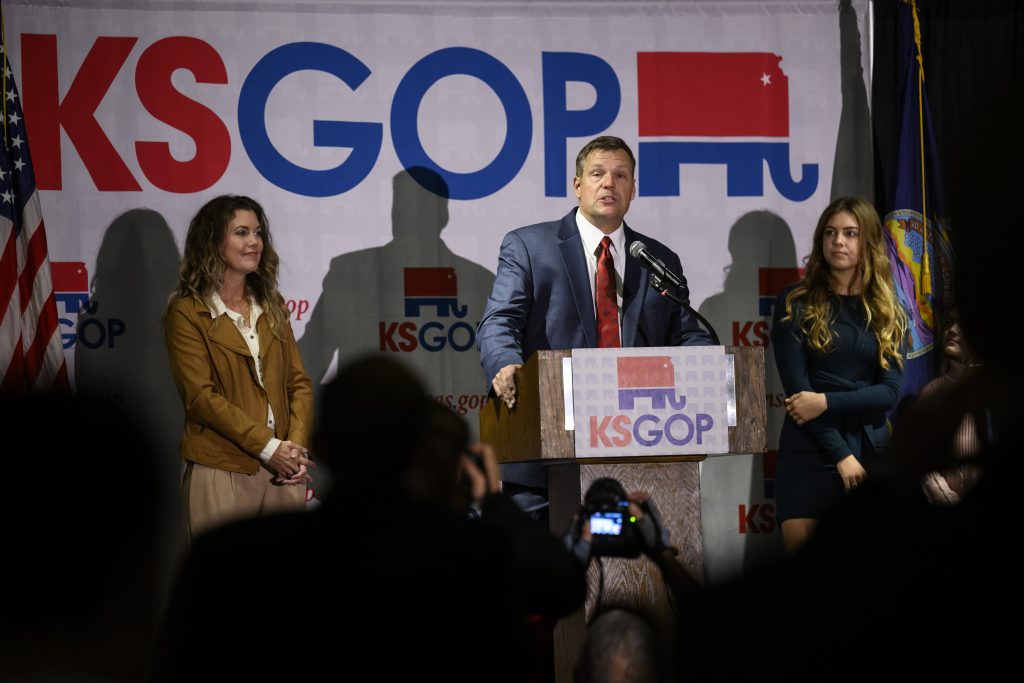Kansas attorney general urges county to keep ballots longer than is allowed to aid sheriff’s probe

Kris Kobach, Republican candidate for attorney general of Kansas, gives a victory speech as he is flanked by his wife, Heather, at left, and family during a Republican watch party in Topeka, Kan., Tuesday, Nov. 8, 2022. (AP Photo/Reed Hoffmann)
By JOHN HANNA Associated Press
TOPEKA, Kan. (AP) — The Republican attorney general in Kansas has urged the state’s most populous county to postpone a legally required destruction of old ballots because the sheriff there says his investigation of possible election crimes remains open even though it’s led to no criminal charges in two years.
Attorney General Kris Kobach, an early supporter of former President Donald Trump who has for years described election fraud as a serious issue, sent a letter Wednesday to the election commissioner in Johnson County in the Kansas City area. Kobach said officials should preserve ballots from 2019, 2020 and 2021 even though state law required all of them to be destroyed by the fall of 2022.
“Allowing the Sheriff’s Office to complete its investigation is in the interest of justice and provides the public with confidence in the integrity of their electoral system and election outcomes,” Kobach wrote in his letter, which became public Thursday.
The county has yet to destroy the old ballots because Sheriff Calvin Hayden has said he received scores of tips about potential irregularities starting in the fall of 2021 and is still investigating. Hayden, a Republican, has questioned the integrity of the county’s 2020 elections and in the summer of 2022 participated in a conference for a group that promotes a dubious theory that sheriffs have virtually unchecked power in their counties.
With no evidence of significant problems in the county’s elections — and none statewide — the Johnson County Commission took a step earlier this month toward the destruction of old ballots by allowing its chair to appoint a Democratic and a Republican observer. Hayden then asked for officials to continue preserving them, County Commissioner Charlotte O’Hara said during a meeting.
Hayden’s office said Thursday that its investigation is ongoing but declined further comment.
The attorney general’s letter did not say whether he would file a lawsuit or pursue some other step should election officialis move ahead with destroying the ballots. His office did not immediately respond to an email asking questions about the letter.
Baseless conspiracy theories have circulated widely among Republicans since the 2020 elections and prompted the GOP-controlled state Legislature to tighten election laws in the name of restoring public confidence. Trump also continues to falsely claim that he won the 2020 election, and Hayden has said he began to question the previously solidly Republican county’s elections when Trump lost there. The county’s politics have become more Democratic over time — in part because of some suburban voters’ distaste for Trump.
Kobach served as Kansas secretary of state from 2011 through 2018 and served as the vice chairman of a short-lived Trump presidential commission on election fraud. He also championed tough voter ID laws, one of which required new voters to show papers documenting their U.S. citizenship when registering and was struck down by the federal courts.
Kobach’s successor as secretary of state, Republican Scott Schwab, declined to comment Thursday, though Schwab has strongly defended the integrity of the state’s elections. Elections in 101 of the state’s 105 counties are run by elected county clerks, but the secretary of state appoints election commissioners in the four most populous ones. Schwab appointed Johnson County’s Fred Sherman in 2020.
Johnson County Commission Chair Mike Kelly said Schwab’s office would supervise the destruction of ballots and said in a statement Thursday that it has “deferred this matter” to Schwab. Sherman did not immediately return a telephone message seeking comment.
The conflict in Kansas’ most populous county comes after activists who believe Trump’s elections lies challenged voter registrations from the 2020 elections across the U.S. even as county election officials were preparing for the fall 2022 elections.
Kansas law requires election officials to destroy the ballots for local elections after six months, unless a result still is being contested. Ballots in state and national elections must be destroyed after 22 months. Under that rule, the ballots for the November 2020 election were to have been destroyed in September 2022.
But Kobach wrote in his letter that he is concerned that destroying the ballots would hinder Hayden’s investigation.
“The preservation of any potential evidence is crucial to the integrity of this investigation, and the evidence should be retained until the case is formally closed and any and all resulting defendants are prosecuted,” Kobach wrote.
One issue for county election officials across the U.S. in preserving old ballots past their destruction date is space, but Kobach wrote in his letter that Hayden’s office “is able to provide secure storage space.”









